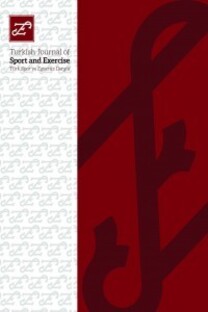Analysis of elite male wrestlers' social comparison levels according to socio-demographic backgrounds
Analysis of elite male wrestlers' social comparison levels according to socio-demographic backgrounds
___
- 1. Alan S, Gilbert P. A social comparison scale: psychometric properties and relationship to psychopathology. Personal Individual Differences, 1995; 19(3): 293-299.
- 2. Balyan M, Yerlikaya Balyan K, Kiremitçi O. farkli sportif etkinliklerin ilköğretim 2. kademe öğrencilerinin beden eğitimi dersine yönelik tutum, sosyal beceri ve öz yeterlik düzeylerine etkileri. Selçuk Üniversitesi Beden Eğitimi ve Spor Bilim Dergisi, 2012; 14(2): 196-201.
- 3. Blanton H. Evaluating the self in the context of another: The three-selves model of social comparison assimilation and contrast. In Cognitive social psychology: The Princeton symposium on the legacy and future of social cognition Mahwah, NJ: Erlbaum: 2001.
- 4. Büyüköztürk Ş, Kılıç Çakmak E, Akgün, Ö.E, Karadeniz, Ş, Demirel F. Bilimsel Araştırma Yöntemleri. Ankara: Pegem Akademi Yayınları, 2012.
- 5. Çakmak Z, Kara H. Yöneticilerde benlik algilamalarinin belirlenmesi: sanayi örgütlerinde bir araştirma. Dumlupınar Üniversitesi Sosyal Bilimler Dergisi, 2011; 30: 301-310.
- 6. Demirel M. Investigating guilt and shame situations of secondary school students according to participation in sport activities and different variables. International Journal of Academic Research Part B, 2013; 5(2): 259-263.
- 7. Er G, Çamlıyer H, Çamlıyer H, Çobanoğlu G, Er N. Çocuk ve ergenlerde spor etkinliklerinin davraniş ve sosyal gelişim üzerine etkileri. Beden Eğitimi ve Spor Bilimleri Dergisi, 1999; 3(3): 29-38.
- 8. Erözkan A. Lise Öğrencilerinin sosyal karşilaştirma ve depresyon düzeylerinin bazi değişkenlere göre incelenmesi. Muğla Üniversitesi SBE Dergisi, 2004; 13: 1-18.
- 9. Kılbaş Ş. Rekreasyon Boş Zamanları Değerlendirme. Ankara: Gazi Kitabevi, 2010.
- 10. Öksüz E, Malhan S. Sosyal karşılaştırma ölçeğinin güvenilirlik ve geçerlilik analizi. 6. Ulusal Aile Hekimliği Kongresi, Bursa, 2004.
- 11. Savaşır I, Şahin NH. Bilişsel Davranışçı Terapilerde Değerlendirme: Sık Kullanılan Ölçekler. Ankara: Türk Psikologlar Derneği Yayınları, 1997.
- 12. Sayıner B, Savasan E, Sözen D, Köknel Ö. Yüksekögretim gençliğinin benlik algısının çesitli değiskenlere göre incelenmesi: İstanbul Ticaret Üniversitesi örneği. İstanbul Ticaret Üniversitesi Sosyal Bilimler Dergisi. 2007; 11(2): 253- 265.
- 13. Slutzky CB, Simpkins SA. The link between childrens sport participation and self-esteem: exploring the mediating role of sport self-concept. Psychology of Sport and Exercise, 2009; 10, 381389.
- 14. Suls J, Martin R, Wheeler L. Social comparison: why, with whom, and with what effect? Current Directions in Psychological Science, 2002; 159-163.
- 15. Şahin NH, Şahin N. Adolescent guilt, shame and depression in relation to sociotropy and autonomy. The World Congress of Cognitive Therapy, Toronto, 1992.
- 16. Taylor SE, Lobel M. Social comparison activity under threat: downward evaluation and upward contacts. Psychological Review, 1989; 96(4): 569-575.
- 17. Wood JV, Giordano-Beech M, Taylor KL, Michela JL, Gaus V. Strategies, of social comparison among people with low-selfesteem: Self-protection and self-enhancement. Journal Personality and Social Psychology, 1994; 67, 713-731.
- Yayın Aralığı: 3
- Başlangıç: 1999
- Yayıncı: Selçuk Üniversitesi, Spor Bilimleri Fakültesi
Analysis of sports injuries in training and competition for handball players
Muharrem KARANFILCI, Banu KABAK
Azize ATLI OZBAS, Nermin GURHAN, Mehmet KOCAK
Analysis of blood lactate and heart rate of indoor sports athletes as a response to various loads
Ismail KAYA, Arslan KALKAVAN, Aydın SENTURK, Halit HARMANCI, M KARAVELIOGLU, Oguzhan YUKSEL, Meryem SAVASLI
Kursat ACAR, Mehibe AKANDERE, Gulsum BASTUG
Umit Dogan USTUN, Halil BISGIN
Şebnem ŞARVAN CENGİZ, Alparslan ÜNVEREN, Mihri KARAVELİOĞLU
Alparslan UNVEREN, Sebnem CENGIZ SARVAN, Mihri Baris KARAVELIOGLU
Asirtmali Aba Wrestling in Turkish sports history and culture
Effects of single dose of beta alanine on performance in weight lifters
